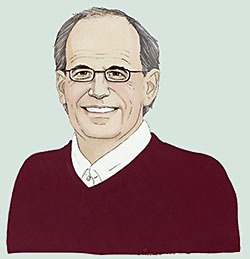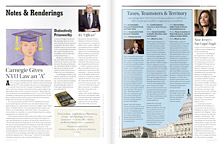New York City Gives Parents a Break
Printer Friendly VersionIn May, New York City announced a dramatic reform to its Family Court legal representation system to provide multifaceted assistance to parents. The New York Law Journal credited Martin Guggenheim ’71, Fiorello LaGuardia Professor of Clinical Law, as the “theorist” who developed the interdisciplinary model the city is now employing, which relies on nonprofit groups to provide social-work services in addition to legal representation for parents and guardians.
The city signed $9.4 million in contracts with Manhattan’s Center for Family Representation (CFR), the Bronx Defenders and Brooklyn’s Legal Services for New York City to collectively handle an estimated 2,595 cases over 26 months. This move will shift representation of about 40 percent of indigent parents in the three boroughs from $75-an-hour city-certified attorneys who have been their sole source of parent representation until now, to the three nonprofit organizations.
 “Before this change, the city was shortchanging the parents’ representatives,” says Guggenheim, a long-time proponent of advocating to rehabilitate entire families, instead of focusing exclusively on children’s legal rights during court proceedings (see “Caught by Good Intentions”). “It’s the first time that the city has seen fit to try to level the playing field by providing equal resources to all parties in child-welfare cases.”
“Before this change, the city was shortchanging the parents’ representatives,” says Guggenheim, a long-time proponent of advocating to rehabilitate entire families, instead of focusing exclusively on children’s legal rights during court proceedings (see “Caught by Good Intentions”). “It’s the first time that the city has seen fit to try to level the playing field by providing equal resources to all parties in child-welfare cases.”
Students in Guggenheim’s Family Defense Clinic will work on cases with Legal Services for New York City. The clinic partners students from NYU’s School of Social Work with law students to handle cases that usually concern parental abuse and neglect. Both CFR and the Bronx Defenders also employ parent advocates—usually social workers—a multidisciplinary approach developed by Guggenheim to address circumstances in which parents require guidance and assistance, but not necessarily legal advocacy, such as reporting on their progress in drug-rehabilitation or parenting programs.
“The city’s decision to create organizations to represent parents is nothing short of revolutionary. The support of interdisciplinary representation is a tribute to its recognition that families need strong legal representation and a wide array of services and support to strengthen them and make reunification possible,” says the Bronx Defenders’ Executive Director Robin Steinberg ’82. Her organization provides holistic, community- based legal and social services for defendants in the criminal-justice system.
Focusing on circumstances both inside and out of the courtroom will greatly improve legal service for families, says Guggenheim. “Our law school developed a model of how to represent parents effectively,” he says. “It is gratifying that New York City agrees that providing excellent representation requires working closely with parents outside of court.”
